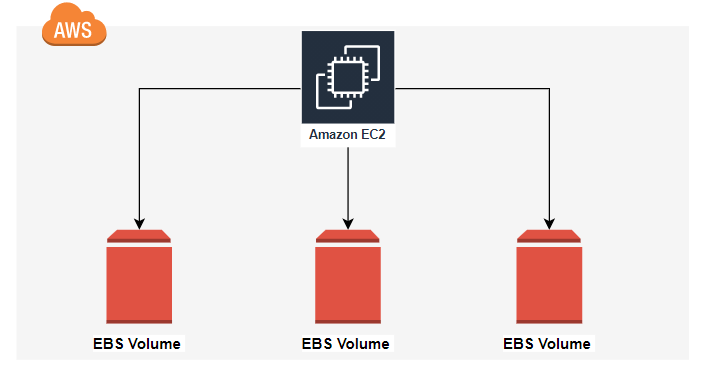Amazon Elastic Block Store (EBS)

Amazon EBS is an easy to use, high-performance, block-level storage solution designed for EC2 to store persistent data. EBS can be dynamically attached, detached, and scaled with any EC2 instance, like physical hard drives or volume storage.
You can use EBS to store any kind of data such as relational and NoSQL databases, enterprise applications, containers, applications, big data analytics engines, and file systems. EBS offering guarantees 99.999% availability and protection against failures by replicating within the Availability Zone (AZ).
AWS EBS is different from the standard EC2 Instance Store, which stores temporary data and deletes when you stop or terminate your instance.
Features of Amazon EBS
- You can create EBS volumes in any Availability Zone and created EBS can be attached to any instances in that same Availability Zone. To move EBS outside of the Availability Zone, you can create a snapshot and restore that snapshot to a new volume anywhere in that Region.
- You can copy snapshots to other Regions and then restore them to new volumes there, by this way you can leverage multiple AWS Regions for geographical expansion, data center migration, and disaster recovery.
- You can create your EBS volumes as encrypted volumes, in order to meet data-at-rest encryption requirements. When you create an encrypted EBS volume and attach it to a supported instance type, data stored at rest on the volume, disk I/O, and snapshots created from the volume are all encrypted.
- You can create point-in-time snapshots of EBS volumes that are backed up to the Amazon S3. Snapshots protect data for long-term durability, and it can be used to create new EBS volumes.
- You can monitor the performance metrics such as bandwidth, throughput, latency, and average queue length
of your volumes to make sure that you have enough performance for your applications. - Amazon EC2 is integrated with AWS IAM service which enables user access control to the EBS volumes.
- Amazon EBS provides the following volume types: General Purpose SSD, Provisioned IOPS SSD, Throughput Optimized HDD, Cold HDD, and Magnetic volumes.
Amazon EBS volume types performance and use cases
| Volume Type | General purpose SSD | Provisioned IOPS SSD | Throughput Optimized HDD | Cold HDD | Magnetic Volume |
| Description | General purpose SSD volume that balances price and performance for a wide variety of transactional workloads | Highest performance SSD volume designed for mission-critical applications | Low cost HDD volume designed for frequently accessed, throughput- intensive workloads | Lowest cost HDD volume designed for less frequently accessed workloads | Previous generation HDD |
| Use Cases | 1. Low-latency interactive apps. 2.Development and test environments | 1. Workloads that require sustained IOPS performance or more than 16,000 IOPS 2. I/O-intensive database workloads | 1. Big data 2. Data warehouses 3. Log processing | Throughput-oriented storage for data that is infrequently accessed Scenarios where the lowest storage cost is important | Workloads where data is infrequently accessed |
| Volume Size | 1 GiB – 16 TiB | 4 GiB – 64 TiB | 125 GiB – 16 TiB | 125 GiB – 16 TiB | 1 GiB-1 TiB |
| Max IOPS per volume | 16,000 | 64,000 -256,000 | 500 | 250 | 40-200 |
| Max throughput per volume | 250-1,000 MiB/s | 1000-4,000 MiB/s | 500 MiB/s | 250 MiB/s | 40–90 MiB/s |
| Amazon EBS Multi-attach | Not supported | supported | Not supported | Not supported | – |
| Boot volume | Supported | Supported | Not supported | Not supported | Supported |
Amazon Elastic Block Store
